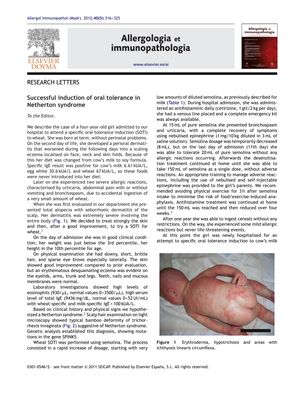Successful Induction of Oral Tolerance in Netherton Syndrome
October 2011
in “
Allergologia et immunopathologia
”

TLDR A girl with Netherton syndrome was able to eat wheat without allergies after a special treatment.
The document reports the case of a four-year-old girl with Netherton syndrome who underwent successful specific oral tolerance induction (SOTI) for wheat. Netherton syndrome is an autosomal recessive disorder characterized by severe eczema, abnormal hair growth, and severe food allergies. The girl had a history of severe allergic reactions to wheat and presented with total alopecia and severe dermatitis. After improving her skin condition, she was admitted to the hospital for wheat SOTI using semolina, starting with very low amounts and gradually increasing the dosage. Despite experiencing bronchospasm and urticaria at 15 mL of pure semolina, which was treated with nebulised epinephrine, she was able to tolerate 20 mL by the end of her hospital stay. The desensitization treatment continued at home, and after one year, she could ingest cereals without restrictions. Her wheat-specific IgE levels decreased significantly from >100 KUA/L to 8.63 KUA/L. The girl was also undergoing SOTI for cow's milk and reached a dose of 60 mL of pure milk after eight months. This case is the first reported successful SOTI in a child with Netherton syndrome, suggesting that desensitization trials might be effective even in patients with genetically determined conditions.




